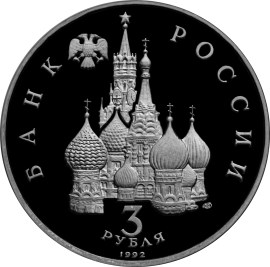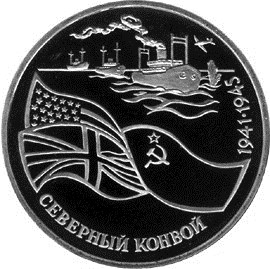North Convoy
Obverse
in the center of the disc - the relief image of cupolas of the Intercession Cathedral on the Moat on the Red Square and Spassky Tower of the Moscow Kremlin, to the left above – the two-headed eagle with wings down, under the cathedral to the right – the mint trade mark, at the bottom in the centre, in three lines – the denomination and year of issue: "3 РУБЛЯ 1992" (3 RUBLES 1992), along the rim – semicircular inscriptions, to the left: "БАНК" (BANK), to the right: "РОССИИ" (OF RUSSIA).
Reverse
in the centre of the disc – the relief depiction of three ships attacked by a bomber, below from the left to the right – national flags of the United States, Great Britain and the Soviet Union, along the rim – semicircular inscriptions along the rim, at the bottom: "CЕВЕРНЫЙ КОНВОЙ" (NORTH COVOY), to the right - dates: "1941-1945".
Authors
The artist: A. V. Baklanov
The sculptor: S. M. Ivanov
Mint: Leningrad Mint (ЛМД)
The edge: two inscriptions "ТРИ РУБЛЯ" (THREE RUBLES) divided by two asterisks.
The Allied Convoys - special groups of transport and patrol ships were organized by the United States, Great Britain and the Soviet Union – participants of the Anti-Hitler Coalition during the Great Patriotic War II - for delivering through the North Atlantic to the Soviet ports the arms, military hardware, food and strategic raw materials from the Soviet Union to Allies. The first British convoy arrived in Arkhangelsk on August 31, 1941. In all, the Soviet ports accepted 42 convoys and dispatched 36 ones (all together 722 transport ships, 682 from which reached ports of destination). That unprecedented experience of organizing stabile sea traffic in the wartime and under rugged northern climate conditions was of great importance for the victory of Allied over the common enemy.


